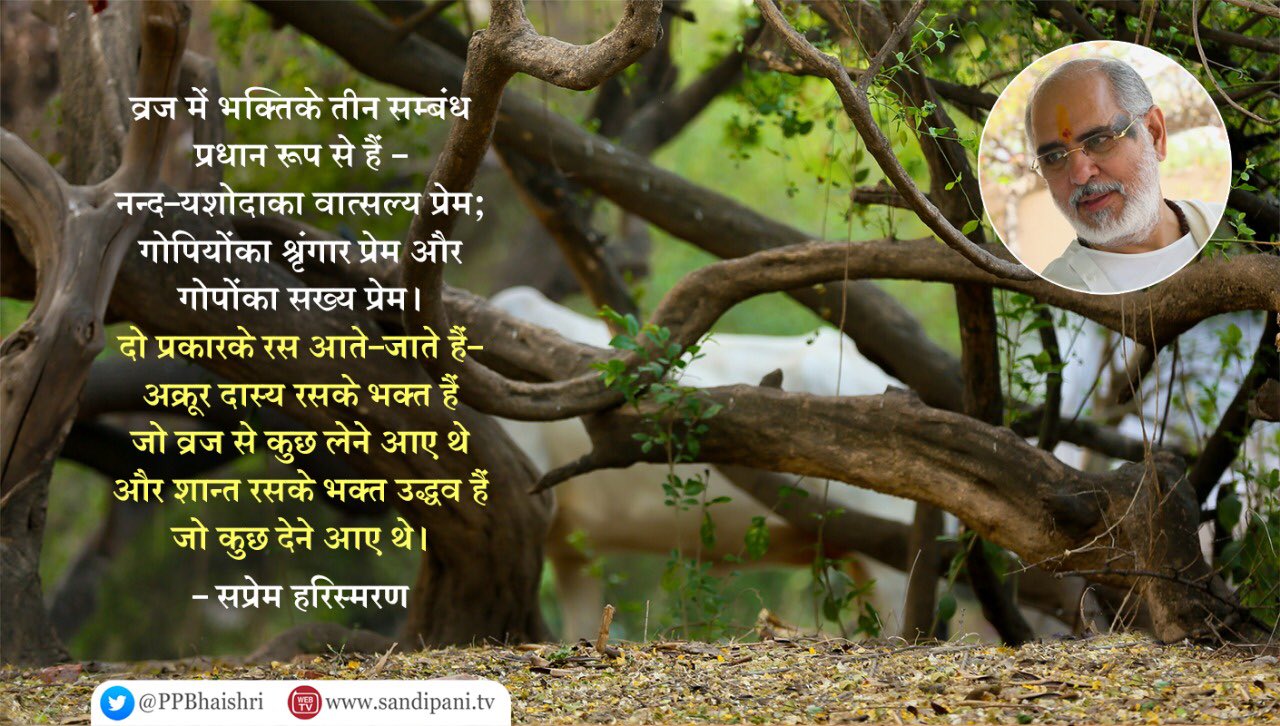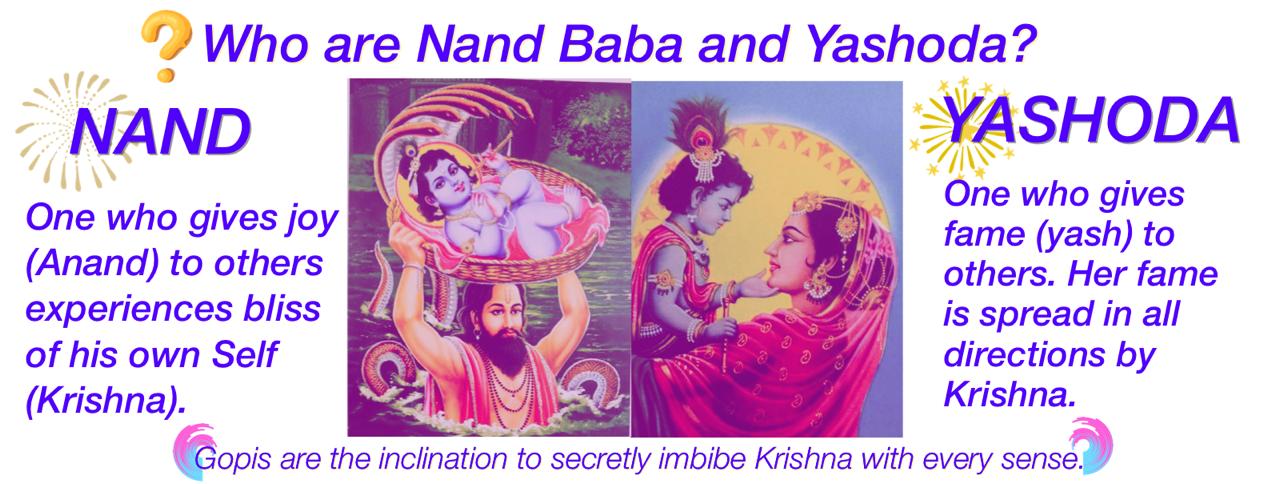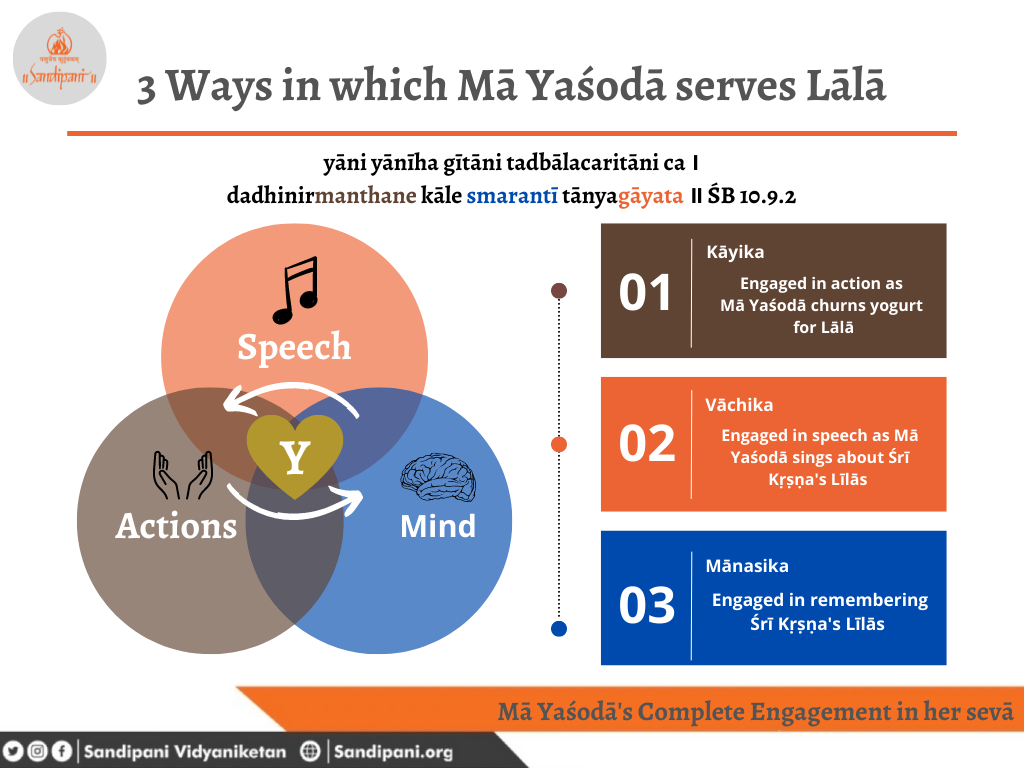Shlok of the Week 23 – Shrimad Bhagavat – 10.9.1-2
Ten facts about Maa Yashoda in Damodar Leela
Ten facts about Maa Yashoda in Damodar Leela

Primarily three devotional relationships exist in Vraja – parental love of Nanda-Yaśodā;
romantic love of the Gopis and bond of friendship with Gopas. Two mellows of devotion
come and go – Akrūra is servitude who comes to take from Vraja and Uddhava is
tranquility who come to give to Vraja.
#Saprem_Harismaran | @PPBhaishri
śrīśuka uvāca
ekadā gṛhadāsīṣu yaśodā nandagehinī ।
karmāntaraniyuktāsu nirmamantha svayaṃ dadhi ॥ 10.9.1
yāni yānīha gītāni tadbālacaritāni ca ।
dadhinirmanthane kāle smarantī tānyagāyata ॥ 10.9.2
Śrīmad Bhāgavata Mahāpurāṇa 10.9.1-2
श्रीशुक उवाच
एकदा गृहदासीषु यशोदा नन्दगेहिनी ।
कर्मान्तरनियुक्तासु निर्ममन्थ स्वयं दधि ॥ १०.९.१
यानि यानीह गीतानि तद्बालचरितानि च ।
दधिनिर्मन्थने काले स्मरन्ती तान्यगायत ॥ १०.९.२
श्रीमद् भागवत महापुराण १०.९.१-२
श्रीशुकदेवजी कहते हैं – परीक्षित्! एक समय की बात है, नन्दरानी यशोदाजी ने घर की दासियों को तो दूसरे कामों में लगा दिया और
स्वयं (अपने लाला को मक्खन खिलाने के लिए) दही मथने लगींं॥ १ ॥
मैंने तुमसे अबतक भगवान की जिन-जिन बाल-लीलाओं का वर्णन किया है, दधिमंथन के समय वे उन सबका स्मरण करतीं
और गातीं भी जाती थीं॥ २ ॥
Ten facts about Maa Yashoda in Damodar Leela
śrīśuka uvāca
ekadā gṛhadāsīṣu yaśodā nandagehinī ।
karmāntaraniyuktāsu nirmamantha svayaṃ dadhi ॥ 10.9.1
yāni yānīha gītāni tadbālacaritāni ca ।
dadhinirmanthane kāle smarantī tānyagāyata ॥ 10.9.2
“One (special) Day” (ekadā) Mother Yaśodā expresses her Love for Lālā in a truly
special way…and he fully reciprocates in a truly special way!
Ten Interesting Facts
1. Yaśodā means ‘one who grants fame’.
Does the Lord lack in fame in any way? Bhagavāna is one who is the storehouse of all six opulences, including fame. Yet, Mother Yaśodā is so magnanimous that she heightens and further reveals the fame of the Lord (who is the very basis of all fame).

Click Here to Learn More: https://sandipani.org/nandotsav-bliss-incarnate/
2. The very best of Butter for her beloved!
This pastime begins one auspicious day with the pure-hearted Mother Yaśodā desiring to prepare freshly churned butter for her son with her own hands.
3. What makes her butter so special?…
The unselfish and wholesome love of a mother for her child is unparalleled. Food satisfies and satiates in proportion to the love and purity with which it is prepared. As such, the butter churned by her own hands far surpasses even the best preparation of any paid servant.
4. Yaśodā Nandagehinī…. A Queen of the House of Nanda (Bliss).
She dedicates her greatness to serving her great son with overflowing, selfless motherly love (Sneha). One who is filled with bliss, gives bliss. One who is filled with sorrow, spreads sorrow. Yaśodā has only joy to give!
5. Complete engagement…
‘Tat Sukhe Sukhitvaṃ’– the well-being of her child is her only happiness and aim. She is fully committed to this, and all her emotions, words and actions are effortlessly intertwined to Śrī Kṛṣṇa. She thinks of his sweet words and latest antics, she sings his sweet names with love, and she churns butter for him with her hands.
An exalted personality is one whose thoughts, words and deed are one – this defines their character. Mother Yaśodā is supreme amongst devotees who enjoy the bond of vātsalya prema (parental love) for the Lord.
One who thinks of her performing such pure Sevā – sitting and churning, singing, and thinking of the Lord – develops greater devotion, by her grace!

6. Kṛṣṇa’s curiosity is piqued!
Hearing his mother’s bangles and other ornaments sweetly tinkle as her entire body engages in the process of churning curd into butter, Baby Kṛṣṇa leaves his cot and is overwhelmed with love seeing his mother perspiring but unaware of herself in this Sevā.
He hungrily seeks his mother’s lap and morning feed of milk! Placing his hand on the churning rod he stops her churning (as if to say the fruit of all her Sevā is already hers). Taking Him in her lap, her milk begins to spontaneously flow out of affection.
Whilst love is an emotion and has no physical form, a mother’s milk is an exception that expresses her love for her child!
7. The Lord’s anger is an expression of Love, as is Mother Yaśodā’s!
This divine feeding of the Lord is interrupted as Mother Yaśodā rushes to save a pan of milk from boiling over onto the flame and the ever-fulfilled Lord is so angry due to his unfulfilled desire for his mother’s milk that He breaks her churning pot and runs away with butter from it.
He shares this stolen butter with his friends – the monkeys, birds in the courtyard of Nanda Bhavana – when he sees an angry Mother Yaśodā chasing after him with a stick to discipline him for his anger.
8. From Stick to Rope – After quite the chase….
Mother Yaśodā finally catches hold of Kṛṣṇa but seeing her son’s tear-smeared face – due to fright at the sight of the stick in her hand, she throws it away and decides to teach him a lesson by tying him up with rope instead.
9. The Lord’s greatness is enhanced by bondage!
The fact is that the eternally liberated supreme Lord accepts bondage entirely out of his own grace, seeing the love of His devotee. No matter how hard Mother Yaśodā tried, she was unable to tie the Lord and the rope fell short by two finger lengths every time.
Finally, seeing his mother’s exertion the Lord felt merciful towards her and agreed to be bound by his own grace – ‘dṛṣṭvā pariśramam kṛṣṇaḥ kṛpayāsīt sva-bandhane’ (ŚB 10.9.18).
As ‘Mukunda’ He grants liberation to others, yet, as ‘Dāmodara’ He chooses the bond of love for Himself!
10. Mukunda becomes ‘Dāmodara’…
Yaśodā grants the name ‘Dāmodara’ (dāma = rope; udara = stomach) to the Lord through this unique pastime, which results in her tying her baby son to a mortar with a cord at his waist!
- Did-You-Know
How did Mother Yaśodā smile and bind the Lord who has no beginning nor end, no interior nor exterior, no front nor rear? Explore 10 interesting facts about this ‘Dāmodara
Līlā’
Click-Here to Listen:
Share your answer or a fun-fact in the comments section below……
#ShrimadBhagavat #Mahatmya #ShlokOfTheWeek #SVN_SOW #ScriptureOfLove
Series by Rishi Harshitbhai Shukla – @HarshitbhaiShukla;
Nimishaben Sadhu (India);
Rajeshbhai Purohit (UK).
About this Article
This is a part of an ongoing series to learn a Shlok a week from the Purushottam Maas Shrimad Bhagavat Katha by PujyaBhaishriRameshbhaiOza.
We hope devotees are able tosavour a few fun facts on these verses with an enhanced interest for the context and divine nuances through this series.
This Article is the 23rd in the ‘Shlok of the Week’ Series.